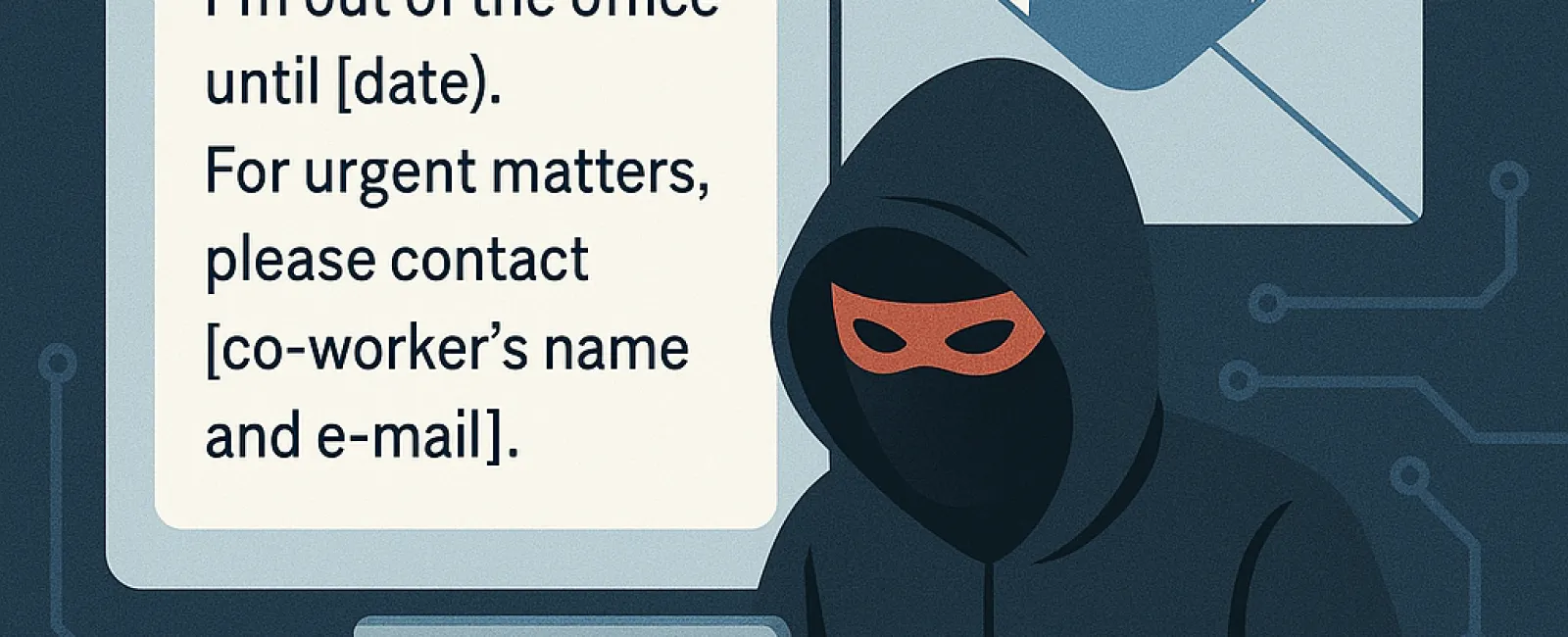June 16, 2025
Set your out-of-office message once, then relax. But while you're busy packing for your getaway, your inbox could be unwittingly sending a risky signal:
"Hello! I'm away until [date]. For urgent help, please reach out to [coworker's name and e-mail]."
Seemingly harmless and handy, right?
Unfortunately, this is exactly the kind of information cybercriminals thrive on.
Your auto-reply, designed to keep communication smooth, can unintentionally provide cyber attackers with valuable details to exploit.
Consider what a typical out-of-office message reveals:
● Your full name and job title
● Dates when you're unreachable
● Alternate contacts with their email addresses
● Details about your team or internal roles
● Even reasons for your absence (like "attending a conference in Chicago")
This information equips cybercriminals with two key advantages:
1. Perfect Timing: They know when you're away and less likely to spot suspicious activity.
2. Precise Targeting: They can impersonate the right people and tailor their scams effectively.
This combination sets the stage for devastating phishing or business email compromise (BEC) attacks.
Typical Scam Scenario
Step 1: Your auto-reply message goes out.
Step 2: A hacker uses that info to impersonate you or your listed alternate contact.
Step 3: They send an urgent email demanding a wire transfer, passwords, or sensitive documents.
Step 4: Your colleague, caught off guard, believes the request is legitimate.
Step 5: You return from vacation to discover a large unauthorized payment has been made.
Such incidents happen more often than you might expect, especially in companies with frequent travelers.
If your business has employees who travel regularly—like executives or sales staff—and others manage communications in their absence, such as assistants or admins, it creates an ideal environment for cybercriminals:
● Admins handling emails from multiple sources
● Familiarity with processing payments and sensitive requests
● Operating quickly, often trusting the identity of the sender without thorough verification
One well-crafted fraudulent email can bypass safeguards and lead to costly security breaches or fraud.
Protect Your Business From Auto-Reply Exploitation
Don't eliminate out-of-office messages; instead, use them strategically and implement protective measures. Here’s how:
1. Be Vague
Avoid sharing detailed schedules or naming backup contacts unless absolutely necessary.
For example: "I'm currently away and will respond upon my return. For immediate help, please contact our main office at [main contact info]."
2. Educate Your Team
Ensure your employees understand:
● Never act on urgent financial or sensitive requests based solely on email.
● Always verify unusual requests through a secondary method, such as a phone call.
3. Deploy Email Security Solutions
Use advanced email filtering, anti-spoofing protocols, and domain protection to reduce the risk of impersonation attacks.
4. Enable Multifactor Authentication (MFA)
Activate MFA on all email accounts to block unauthorized access even if passwords are compromised.
5. Partner With a Proactive IT Security Team
Collaborate with experts who monitor for suspicious logins, phishing attempts, and unusual activities before harm occurs.
Enjoy Your Vacation Without Cybersecurity Worries
We specialize in building robust cybersecurity frameworks that protect your business—even when your team is out of the office.
Click Here or call us at 919-741-5468 to schedule your FREE 15-Minute Discovery Call.
We'll assess your system vulnerabilities and guide you in securing your business so you can truly relax on vacation without your inbox becoming a liability.





